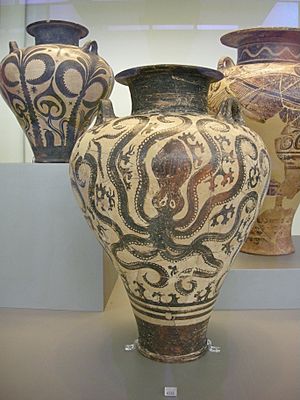Mycenaean palace amphora with octopus (NAMA 6725) facts for kids
The Mycenaean palace amphora with octopus is a very old vase found in Greece. It is kept safe today at the National Archaeological Museum of Athens. This special vase was made around 1500 BC, which is about 3,500 years ago! It was discovered in a burial site from the ancient Mycenaean culture near a place called Argos.
What is an Amphora?
An amphora is a type of ancient pot, usually with two handles, used for storing liquids like wine or oil. This particular amphora is unique because it has three handles. It is known as a "Palace amphora" because these large, fancy vases were often found in important buildings or palaces.
A Special Sea Design
This Mycenaean amphora is famous for its amazing decoration. It shows a lively scene from the sea! You can see rocks, seaweed, and three big octopuses. Their long, winding tentacles wrap all the way around the vase. This style of art is called "Marine Style."
Influenced by Minoan Art
The artists who made this vase were inspired by the Minoan people. The Minoans lived on the island of Crete and were known for their beautiful pottery, especially their "Marine Style" designs. Mycenaean artists learned a lot from the Minoans, and this vase is a great example of that influence. It shows how ideas and art styles traveled between ancient cultures.
 | Kyle Baker |
 | Joseph Yoakum |
 | Laura Wheeler Waring |
 | Henry Ossawa Tanner |


